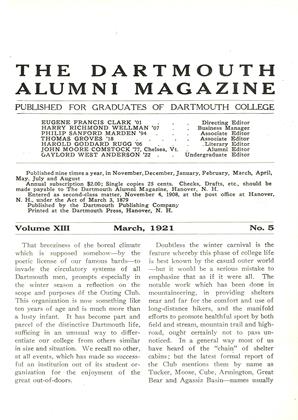A survey of the work of the American Rhodes scholars has just been finished by their alumni association. The purpose of it was primarily to find out whether the scheme had met the expectations of the founder, and secondarily to let the public and prospective scholars know just what the Rhodes graduates were doing.
The system of the Rhodes scholarship was founded by the will of Cecil John Rhodes. This provided for supporting at Oxford University, for the term of three years each, about 176 selected scholars from the British Colonies, the United States and Germany. According to the will, the United States is entitled to send two of its best students from each of the States and Territories. The requirements are the completion of at least two years in college and an age limit of from 19 to 25 years. The selections are made on the basis of a man's record in school and college, according to the four points outlined in the will—scholarship, character, interest in outdoor sports and interest in one's fellows and instincts for leadership.
America has been sending men to Oxford since 1904. The full quota has never been filled; 351 men were appointed during the years 1904 to 1914. The survey stops at 1914.
Of the men about whom the facts are known, says the survey, ninety-nine have published books or articles. It continues: "The professional standing of these men will in many cases depend more on these publications than on their academic honors. It is not possible, of course, to rate their value here, but it is interesting to note that the subjects range from technical topics, such as the 'Law of the Hendecasyllable' and 'The Action of Chlorine on Phenyl-Carbamide' to matters of general interest, such as 'The Interpretation of the "Bone Dry" Prohibition Law.' "
This is a summary of the present occupations of the Rhodes scholars:
Education 114 Divided : College Presidents, deans, &c. 7 Other college teachers 84 Educational administration 7 Secondary school 11 Full time, law, theology, medicine 5 Law 72 Business 38 Social and religious work (including twelve ministers) 23 Government service 15 Graduate or professional students 10 Scientific Work 10 Literary and editorial 8 Medical work 7 Miscellaneous 4 Poor health 2 Total 303 48 unaccounted for or dead.
Attention is called to the fact that the oldest of the men are between the ages of 35 and 40, and the youngest between 25 and 30. That, in a measure, may account for the predominance of teaching positions. The inclusion of seventeen men in "Who's Who" is taken as an indication of success in the choices of men who were sent to Oxford.
 View Full Issue
View Full Issue
More From This Issue
-
 Article
ArticleCHARLES DOE, 1849
March 1921 By JUDGE JOHN ELIOT ALLEN '94 -
 Article
ArticleA REPORT TO THE ALUMNI
March 1921 By JAMES P. RICHARDSON -
 Article
ArticleThat breeziness of the boreal climate
March 1921 -
 Sports
SportsBASKETBALL
March 1921 -
 Article
ArticleWEBSTER LETTER PROPHESIED TELEPHONE AND TELEGRAPH
March 1921 -
 Books
BooksPUBLICATIONS
March 1921







